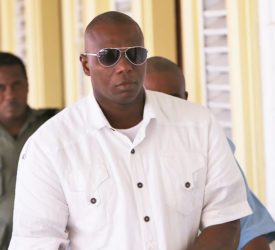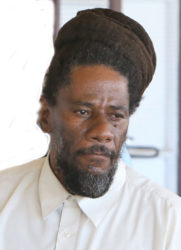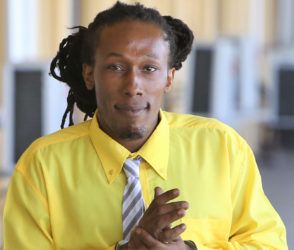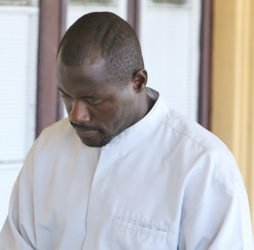Clebert Reece, the prosecution’s star witness, yesterday testified about how the 2008 Bartica Massacre was executed, the role he played, and the alleged roles of two of the three persons currently on trial for the 12 murders.
Reece, 39, called ‘Chi Chi,’ a former co-accused in the murder indictments who was last November sentenced to 35 years in jail after pleading guilty to 12 counts of the lesser offence of manslaughter, was cleared by Justice Roxane George SC to testify despite objections by the defence.

It is alleged that the accused Dennis Williams, called ‘Anaconda,’ Mark Royden Williams, called ‘Smallie’ and Roger Simon, called ‘Goat Man,’ on February 17, 2008, murdered Lance Corporal Zaheer Zakir, and Constables Shane Fredericks and Ron Osborne, Edwin Gilkes, Dexter Adrian, Irving Ferreira, Deonarine Singh, Ronald Gomes, Ashraf Khan, Abdool Yasseen, Errol Thomas, and Baldeo Singh.
Though repeatedly told to speak louder, Reece, in a barely audible tone during his testimony, detailed being contacted by now deceased infamous gang leader, Rondell “Fine Man” Rawlins, after which he became part of the gang that would later launch the murderous attack.
When Reece was called to the witness stand yesterday morning at the High Court in Georgetown, the defence lawyers fiercely objected, saying they had been taken by “surprise” since the prosecution had given no prior indication that he would have been called as a witness.
Mark Williams’ attorney, Roger Yearwood, described Reece’s call to the stand as a “trial by ambush.”
Attorneys Saphier Hussain and Peter Hugh, who are representing Dennis Williams and Simon, respectively, shared Yearwood’s sentiments.

Hussain argued that the defence had not been served with any statements of the witness, nor was any foundation laid for him to testify. Counsel added, too, that Reece was not a witness for the prosecution at the preliminary inquiry (PI) and to call him would be allowing fresh evidence in the case, which Yearwood pointed out, must first conform to specific legal requirements that the prosecution did not satisfy.
Hussain further argued that Reece was a co-accused and that the circumstances in which he would be giving evidence were not “compellable,” though he might be a “competent” witness.
In response to the objections, Prosecutor Diana Kaulesar argued that Reece was called as a witness in the PI and though not for the prosecution at that time, he gave sworn testimonies which formed part of the depositions that the defence lawyers had in their possession and so they could not have been taken by surprise.
On the issue of compellability, the prosecutor said that the State cannot compel a witness to testify, as that is an undertaking only a court can take and no application was made in the current case.

The prosecutor noted, too, that contrary to the defence’s contention, the State did not enter into a plea bargain with Reece, and that even if there were, the legislation does not provide for a witness who enters such an arrangement to be compelled to testify.
Kaulesar added that as it relates to the statements of the witness, they were led at the PI, but at that time did not, and could not, form part of the prosecution’s case, as he was then a co-accused. She, however, noted that this is no longer the case as he has been sentenced.
Kaulesar contended, that a former accused testifying on behalf of the State is a practice known to the courts and she argued that in the interest of justice the witness should be allowed to testify.
After hearing submissions from both sides, Justice George, referring to case law, ruled that the witness could testify as the defence would not have been caught by surprise. She said the defence had the deposition to aid in the preparation of its defence, which would have also indicated what the witness was coming to say.
The judge noted, too, that the absence of the witness’ statements would not be detrimental or prejudicial to the accused.
Killings

According to Reece, it was his cousin, Michael Caesar, who is also now serving time for the killings, who had taken his cell number, through which “Fine Man,” who was later identified as “Sad Man,” contacted him.
Caesar, 34, called ‘Capone,’ was last month sentenced to 60 years in jail after pleading guilty to unlawfully killing a total of 20 persons in both the Lusignan and Bartica massacres.
Caesar, like his older cousin, was initially indicted for 12 counts of murder in the shooting deaths of the 12 men at Bartica. He, however, also indicated his desire to plead guilty to the lesser counts of manslaughter, which was accepted by the State.
Reece said that after receiving the phone call from “Sad Man,” a white car, carrying four persons who were armed with AK 47s and a handgun, collected him from his girlfriend’s residence.
He said they then headed to Parika, but that some distance before reaching the market, they stopped at a boat builder, who was doing some work on one of the boats. Reece said that they waited there and when the tide rose, he drove the boat to the Parika Stelling.
While there, he said two men placed two drums of gas in the boat. He added that he then received a phone call, as a result of which he transported the boat from Parika to an old wharf at Tiger Bay.
The witness said that “Sad Man” again phoned him, and this time, he went to his aunt’s residence, and from there Dennis Williams accompanied him back to the wharf, where he had earlier left the boat.
From the wharf, Reece said that he, still in the company of Dennis, drove the boat towards the East Coast of Demerara, in the vicinity of Ann’s Grove, where they picked up seven persons.
He identified the persons as Caesar, “Sad Man,” “Chung Boy,” “Mud-Up,” “Small Man,” who is Mark Royden Williams, “Magic,” and “Kussum,” who is also referred to as “Small Fren,” all of whom were armed with either AK 47s or pump-action rifles.
He said that they all then headed back to Georgetown but encountered engine problems, while in the vicinity of Eve Leary, which caused the boat to stop.
Reece said it was at this point, that “Sad Man” placed an AK-47 to his back and began cursing him. He added that “Magic” then told “Sad Man” to desist as they needed Reece to repair the engine.
The convict said that after he had fixed the engine, he transported the men to an island just before Parika, while he alone headed back to Tiger Bay, where he met a man he referred to as “White Boy.” He said that “White Boy” opened the trunk of a car, and took out from a bag an AK-47, a handgun, two bulletproof vests, three grenades, a crowbar and uniforms, all of which he loaded into the boat.
The court heard from the witness that he and “White Boy” then left and went back to the island, where the other men had been dropped off earlier and there they rested for the night.
Reece said that on the evening of the following day—prior to the killings—“Sad Man” spoke to him and they all headed for Bartica and docked at the stelling.
He noted that Caesar, “Sad Man,” “Small Man,” “Magic,” Dennis Williams and “White Boy,” who were all dressed in camouflage suits, headed for the Bartica Police Station. They were all heavily-armed with AK 47s, with the exception of Dennis Williams, who was armed with a pump-action rifle.
Reece said that he, “Chung Boy,” “Mud Up,” and “Kussum” remained behind in the boat with one pump-action gun. The witness related that shortly after, he heard rapid sounds of what appeared to be gunshots, lasting for some 25 minutes.
Reece said that after sometime had passed, the other men returned with pump-action guns, hand guns and two canisters, which “Fine Man” told them to load into the boat.
He added that after the men had returned to the stelling, “Mud Up” and “Chung Boy” called six men off a Banks boat, and placed them to lie on the ground, after which “Fine Man,” collected a gun from “Small Man,” with which he shot five of the six men at the back of their heads.
The witness told the court that he recognised the sixth man who was made to lie on the stelling ground as someone he had known for years and as a result “Magic” told the man to get up and run away.
Reece said he also heard from the other gang members that at that point, they had already killed seven other men. Afterward, he said he drove the boat to Sherima, in the Essequibo River, where he moored it.
Escape
The witness said that they all then boarded a jeep together with their weapons and the other articles they had gotten during the attack. He told the court that “Fine Man” ordered him to pour gas into the boat and set it adrift.
Reece, however, said that he refused to set the boat afire, as he wanted “the police to get a trace, and find it.” Instead, he said he just pushed it out into the river to drift.
The witness said that they all travelled on land with the articles and eventually built a camp. He and “Magic” opened the two canisters, in which they found money, jewellery, some 20lbs of raw gold, a Ziploc bag containing diamonds, $1M and other articles.
Reece added that “Sad Man” gave them each six ounces of gold.
The court heard from Reece that they constantly moved from camp to camp and that they buried the guns and bulletproof vests that were stolen from the Bartica Police Station.
The witness detailed that while at one of their camps, they saw a man in the environs and “Sad Man” hollered on him to come, but the man ran away. The court heard that “Sad Man” and “Chung Boy” ran behind the man to find him, but their efforts were futile. Afterward, Reece said, “Fine Man” told them that they needed to move to another camp.
According to Reece, he always wanted to escape from “Fine Man” and the gang, but that the gang leader monitored all their movements. He, however, said that one day he told Rawlins that he was going to the toilet, and escaped.
Reece said that he was scared to go to the police “and make another report, because the first time I go, they din do nothing about it.”
The trial continues this morning at 9, when Reece is expected to complete his evidence-in-chief, and then be cross-examined by the defence.




